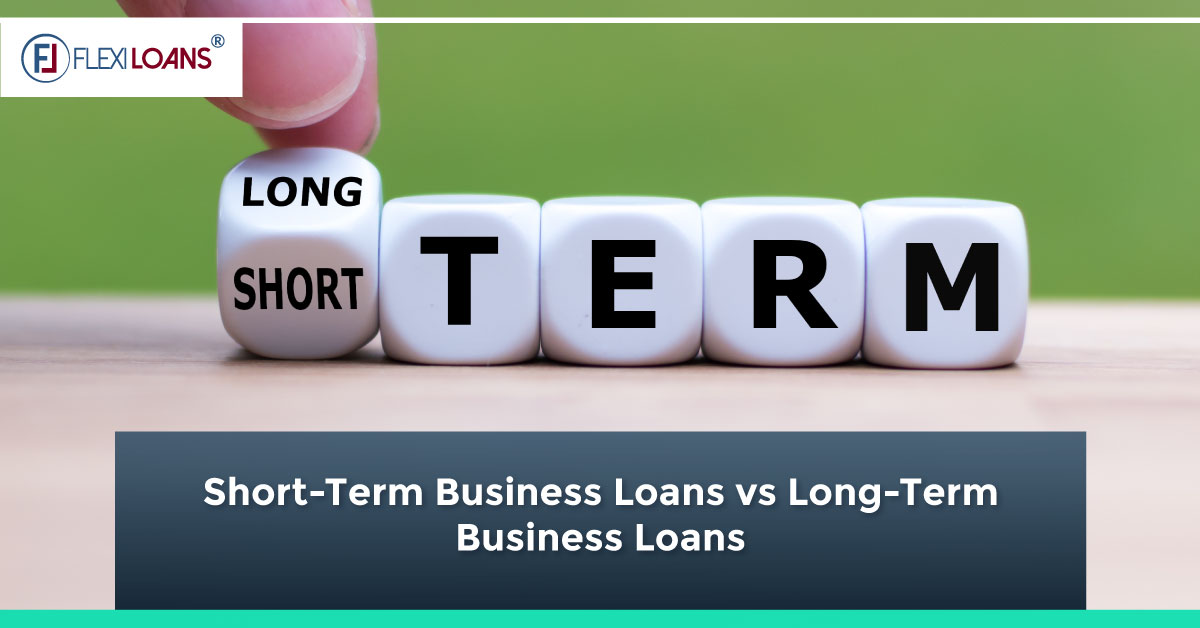Jul 13, 2021

Once you have decided on the loan you want to apply to expand your business, the hard work starts. If you don’t have a firm grasp on your business’s financial growth and wellbeing objectives, you must rapidly catch up to select a loan term that fits your requirements.
Before you can choose between short-term and long-term finance, you must respond to questions about your present and anticipated financial strength, as well as your risk tolerance.
In this article, we’ll examine the definitions of long-term vs short-term financing to help you differentiate between these two extra working capital alternatives. Then, we’ll discuss why opting for short-term vs long-term financing may have a distinct impact on your company.
Are you hunting for short- or long-term financing at a competitive business loan rate of interest? If that is the case, why not approach India’s one of the largest NBFC, FlexiLoans?
What are Short-Term Business Loans: Short-Term Cash Loans?
As the name implies, a short-term business loan has a shorter repayment period. This period is often over a year. The advantage of a short-term cash loan is that it provides immediate liquidity for urgent requirements, such as stockpiling essential inventory goods, paying back suppliers, and sustaining a seasonal cash flow. Typically, business loans need some kind of collateral to guarantee that your vendor is adequately paid if monetisation fails.
However, since short-term cash loans are for a limited period, no collateral is required to get them. Because you may apply for a short-term cash loan without committing any asset as collateral, it is convenient. Additionally, these loans need less paperwork than long-term cash loans.
What are Long-Term Business Loans: Long-Term Cash Loans?
A long-term loan provides more considerable sums and has a longer tenure than a short-term business loan. You may obtain a loan for a period of five to ten years or more with a long-term business loan. Because these loans are considerably larger and are repaid over a longer period, they are used to buy cutting-edge equipment, expand one’s company to new places, and update one’s business infrastructure.
In summary, long-term cash loans need a higher monthly payment. As a result, you may be asked to put up collateral to secure these loans. Loan disbursement is also a somewhat more time-consuming procedure for long-term business loans than short-term business loans. It is because lenders often need extra paperwork to validate your loan application, such as a soft copy of your company’s balance sheet.
Difference between Short-Term Business Loans and Long-Term Business Loans
It’s easier to comprehend the distinctions between long-term and short-term finance when seen through the perspective of a business lender.
- The amount of Loan: The primary distinction between long-term vs short-term financing is the amount borrowed. Naturally, the larger the credit amount, the longer it takes to repay in most instances. Short-term business loans have a smaller loan amount, which makes repayments simpler and without incurring debt.
- Collaterals: A long-term business loan is for a larger sum and has a longer duration, resulting in payments occurring over a longer period. As a result, lenders often need collateral, or security, for these kinds of loans. If a borrower fails, the lender may recoup their losses via the sale of such security or collateral. Short-term loans, on the other hand, are often unsecured and do not need collateral. They may, however, need some kind of indirect collateral in some circumstances.
- Interest Rates: Short-term business loans often have a high-interest rate to adjust for their short payback duration. Typically, short-term business loans without collateral, which increases the risk for lenders in the event of loan default, which is compensated for by charging high-interest rates.
- Time of processing: The primary reason borrowers choose short-term business loans, such as a personal loan, is for the instant liquidity they provide. As a result, the lenders’ approval procedure for these loans is fast and straightforward. Short-term loans need little paperwork. Long-term business loans are granted after all qualifying requirements have been fulfilled, and the borrowers’ creditworthiness has been carefully evaluated. The market value of these assets is determined in the case of secured long-term business loans. Short-term loans are often granted within 24 hours, which is almost difficult with long-term loans.
- Duration: Short-term cash loans typically have a payback period of between one and three years. Whereas long-term cash loans often have a duration of five to ten years. The extended repayment term enables businesses to spread their mortgage payments over a longer period.
Key Differences at a Glance
| Properties | Long-Term Cash Loans | Short-Term Cash Loans |
| Duration | The tenure of long-term business loans ranges between five and ten years, or possibly longer in certain circumstances. | The tenure of short-term business loans ranges between one and three years. |
| Interest % | In the case of long-term business loans, the interest rate is levied at a lower rate. | In the case of short-term cash loans, interest is levied at a greater rate. |
| Eligibility | Stricter conditions for eligibility. | Slightly more flexible eligibility requirements. |
| Documents Required | Paperwork is complicated. | Paperwork is minimal. |
| Time of Processing | They often need a lengthy application procedure that may take up to a week or two. | They often offer faster access to money, up to 24 hours in certain cases. |
| Time for disbursement | Disbursement is determined by the lender and may take up to a week or two | Rapid disbursement, usually within a few days |
Short Term Vs Long Term Financing: Which Business Loan is Best?
To determine if you’ll profit more from a short-term or long-term business loan, create a strategy for how you intend to utilize the loan funds. A specific and short-term objective will need a short-term cash loan. A more ambitious and long-term goal will require the assistance of long-term financing. Additionally, you should consider collateral if you can readily pledge an asset as security for your loan.
How to Decide Which Loan Is Right
1. Purpose of the Loan
This should be the key when choosing between short-term and long-term options. For immediate needs like cash flow or inventory, a short-term business loan provides quick access to funds. The repayment periods range from a few months to two years.
For long-term investments, such as expanding your business or purchasing equipment, a long-term loan offers more capital. The repayment period can even extend beyond five years.
Ensure your choice aligns with your strategy, whether for daily operations or major expenditures.
2. Repayment Capacity
Assessing your business’s ability to repay the loan is crucial. Short-term loans typically have higher monthly payments due to shorter repayment schedules. If your cash flow is strong, these can be cost-effective despite higher interest rates.
In contrast, a long-term business loan spreads repayments over several years, easing the burden on your cash flow. This option is ideal if your finances are tighter, allowing you to focus on growth without the stress of large monthly payments.
Use an EMI calculator for business loans to evaluate which repayment plan best fits your financial situation and compare different loan structures.
3. Loan Amount Needed
It plays a significant role in determining which loan is suitable for you. Short-term loans are generally better suited for smaller financial needs, such as covering operational costs or bridging temporary cash flow gaps.
However, if you require significant capital for long-term investments — like expanding your business or buying machinery — a long-term business loan is more appropriate. These loans offer larger sums with manageable monthly payments, making them ideal for investments that generate returns over a longer period.
4. Interest Rates and Total Loan Costs
Interest rates on short-term loans tend to be higher because of the shorter repayment period. While this means you’ll pay off the loan faster, the higher interest rate could raise your overall costs. In contrast, long-term loans typically offer lower interest rates. However, because you’re repaying the loan over a longer period, the total interest paid may end up being higher.
Using a business loan interest calculator can help you compare the overall costs of short-term and long-term loans. This way, you can determine the most cost-effective option for your business.
5. Collateral and Risk
If you prefer not to pledge assets, a short-term loan may be a better option as they are usually unsecured. They have higher interest rates but allow you to access funds without risking your assets.
If you’re comfortable offering collateral, such as property or equipment, you can secure better terms and a lower interest rate with a long-term loan.
Ultimately, your choice between short-term and long-term loans depends on your business’s immediate needs, repayment capacity and the amount of risk you’re willing to take.
Also Check Out: Business Loan Interest Rates
Conclusion
Deciding between short-term and long-term business loans depends on your business’s financial goals, repayment capacity and the amount of funding required. For smaller, immediate needs, a short-term business loan can be the right choice. However, if you’re planning for long-term growth, a long-term business loan offers more manageable repayments and can help your business thrive by providing larger sums of capital for expansions or significant investments.
Platforms like FlexiLoans make it easy to find the right loan for your business and get funds sanctioned without hassle. Whether you seek quick business loans online or a more substantial business loan in India, ensure you make an informed decision that supports your business’s future.
FAQs
Q1. Why should I choose a short-term business loan?
A short-term business loan is perfect for managing immediate financial needs, such as cash flow or emergency expenses. If your business can handle larger monthly repayments in a shorter timeframe, this option can help you avoid long-term debt while providing quick access to funds.
Q2. What Are the Benefits of a Long-Term Business Loan?
Long-term business loans are beneficial for financing large projects such as expansions, equipment purchases, or property acquisitions. The extended repayment tenure allows for smaller, more manageable EMIs, reducing the burden on your cash flow.
Q3. How can I Apply for a Business Loan?
You can apply for a business loan online through platforms like FlexiLoans, which offer a simple, streamlined process with quick approval and disbursement. By uploading the documents required for a business loan, you can easily complete the application and access the funds you need.
Q4. What Is the Interest Rate for Business Loans?
The interest rate for business loans can vary based on factors such as loan type (short-term or long-term), the loan amount and the lender’s policies. Generally, short-term loans have higher interest rates due to quicker repayment, while long-term loans offer lower interest rates but extend over a longer period.
Q5. What Is the Eligibility for Business Loans?
Eligibility for business loans is typically based on your business’s financial history, annual turnover and credit score. Lenders may also require a few basic documents, such as bank statements, tax filings and proof of business registration.
Q6. Can I Get a Business Loan Without Collateral?
Yes, many lenders, including FlexiLoans, offer collateral-free business loans. You don’t need to pledge any assets, which is ideal for businesses that may not have significant collateral to offer.







